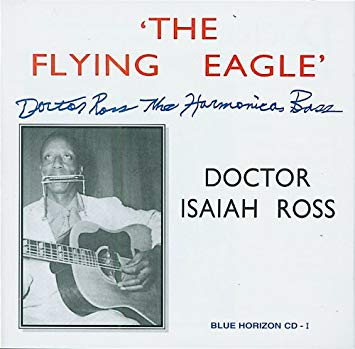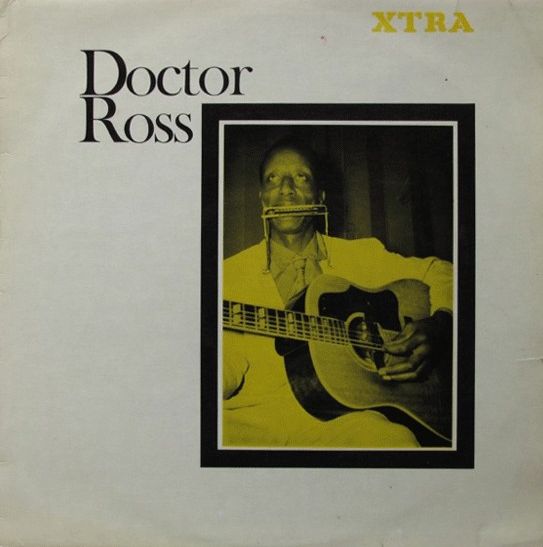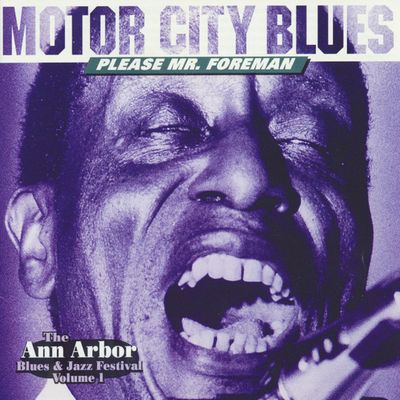Charles Isaiah Ross
b. October 21st, 1925 in Tunica (Mississippi)
d. May 28th, 1993 in Flint (Michigan)


BOOGIE DISEASE
Arhoolie
November 1951 - July 1954
JUKE BOX BOOGIE
Bear Family
November 1951 - 1963
D'origine Cherokee, il grandit dans une famille de onze enfants (il est le plus jeune d'entre eux). Son père Jake Ross joue de l'harmonica et influence son fils qui apprend à jouer de l'instrument. Plus tard, il sera aussi influencé par John Lee "Sonny Boy" Williamson. En aout 1943, il s'installe à West Helena (Arkansas) puis part à l'armée en décembre de la même année. Début 1944, Ross est envoyé dans le Pacifique notamment aux Philippines. Il rentre chez lui en 1948 (mais retourne à l'armée en 1950-51). C'est d'ailleurs pendant ces années d'armée qu'il apprend la guitare et se passionne pour la médecine (pour laquelle on lui donnera ce surnom de "Doctor"). De retour à la vie civile, il s'installe à Memphis et joue dans plusieurs émissions radiophoniques pour WROX, WDIA et KFFA. La renommée qu'il a acquise lui permet d'enregistrer pour le label Sun de Sam Phillips dès novembre 1951. Pour Sun, le Doctor Ross n'est pas encore le one-man band qu'il deviendra plus tard, il chante et joue de l'harmonica et de la guitare. Selon les séances, il est accompagné d'Henry Hill (piano), Reuben Martin (washboard), Tom Troy (guitare) et Bobby Parker (batterie). Les morceaux qu'il grave pour Sun sont tous des pépites dansantes et excitantes, au rythme irrésistible : "Boogie disease", "Shake 'em on down", "Memphis boogie", "Mississippi blues", "Going down south", "Chicago breakdown", "Texas hop". Certains titres seront revendus à Chess. Les 2 CD présentés ici proposent un panorama complet de cette première oeuvre. Le CD Bear Family ajoute les singles plus tardifs gravés pour les labels DIR (son propre label), Fortune et Hi-Q. En 1954, il s'installe à Flint (Michigan) et travaille comme concierge dans une usine General Motors jusqu'à sa retraite.
Cherokee by birth, he grew up in a family of eleven children (he is the youngest of them). His father Jake Ross plays harmonica and influences his son who learns to play the instrument. Later, he will also be influenced by John Lee "Sonny Boy" Williamson. In august 1943, he moved to West Helena, Arkansas, and joined the army in december of the same year. In early 1944, Ross was sent to Pacific, especially to the Philippines. He returned home in 1948 (but returned to the army in 1950-51). It is also during these army years that he learns guitar and becomes passionate about medicine (for which he will be given the nickname "Doctor"). Back in civilian life, he moved to Memphis and appeared in several radio shows for WROX, WDIA and KFFA. The fame he gained allows him to record for Sam Phillips' Sun label in november 1951. For Sun, Doctor Ross is not yet the one-man band he will become later, he sings and plays harmonica and guitar. According to the sessions, he is accompanied by Henry Hill (piano), Reuben Martin (washboard), Tom Troy (guitar) and Bobby Parker (drums). The songs he records for Sun are all dancing and exciting gems, with an irresistible beat : "Boogie disease", "Shake 'em on down", "Memphis boogie", "Mississippi blues", "Going down south", "Chicago breakdown", "Texas hop". Some titles will be sold to Chess. The 2 CDs presented here offer a complete overview of this first work. The Bear Family CD adds the latest singles engraved for the labels DIR (his own label), Fortune and Hi-Q. In 1954, he moved to Flint, Michigan and worked as a janitor in a General Motors factory until his retirement.

THE HARMONICA BOSS
Fortune
1960
Pour le label Fortune à Detroit - produit par Jack & Devora Brown - Doctor Ross grave une poignée de titres en leader du groupe électrique The Disciples (Messengers of Soul). Malgré une qualité sonore juste correcte, la musique se révèle accrocheuse et pleine de feeling même si elle n'atteint pas l'excellence des faces Sun. Certains morceaux sortent du lot comme "Baby stop crying", "My black name ringing", "Going away baby", "I'm not dead", "Miss Ledora blues".
For the Fortune label in Detroit - produced by Jack & Devora Brown - Doctor Ross scores a handful of titles as leader of the band The Disciples (Messengers of Soul). Despite a fairly decent sound quality, the music is catchy and full of feeling even if it does not reach the excellence of the Sun sides. Some songs stand out as "Baby stop crying", "My black name ringing", "Going away baby", "I'm not dead", "Miss Ledora blues".

ONE MAN BAND
Takoma
Sonet
January 1965
En 1964, Pete Welding et Don Kent lui rendent visite chez lui à Flint et lui permettent d'enregistrer à nouveau, arrangeant pour lui ce concert à l'Université de Chicago. Comme le titre l'indique, le Doctor Ross est cette fois seul en configuration one-man band. Il interprète ses chansons avec verve et feeling devant un public conquis (une très belle reprise de "Good morning little schoolgirl").
In 1964, Pete Welding and Don Kent visited him at his home in Flint and allowed him to record again, arranging for him this concert at the University of Chicago. As the title indicates, Doctor Ross is this time alone in a one-man band configuration. He interprets his songs with verve and feeling in front of a conquered audience (a very nice cover of "Good morning little schoolgirl").

DOWN HOME HARP
Testament
January 1965
Dans cette anthologie, on retrouve un morceau inédit du concert à l'Université de Chicago : le bon "Blues for Illinois".
In this anthology, we find an unissued track of the concert at the University of Chicago : the nice "Blues for Illinois".

CALL THE DOCTOR
Testament
February 1965
Enregistré par Pete Welding et Norman Dayron, cet album présente le Doctor Ross à son meilleur en tant que one-man band. Son Blues primitif et puissamment rythmique fait merveille ici même s'il peut sembler un peu répétitif par instants. On trouve d'excellentes pièces comme "Cat squirrel", "Illinois blues", "Dr Ross' rock", "32-20", "Drifting blues". Un titre supplémentaire (le remarquable "Jivin' blues") fut ajouté dans la version CD.
Recorded by Pete Welding and Norman Dayron, this album presents Doctor Ross at his best as a one-man band. His primitive and powerfully rhythmic Blues is a marvel here, though it may seem a little repetitive at times. There are excellent pieces like "Cat squirrel", "Illinois blues", "Dr. Ross' rock", "32-20", "Drifting blues". An additional title (the remarkable "Jivin' blues") was added in the CD version.

AMERICAN FOLK BLUES FESTIVAL '65
Fontana
L+R
Bellaphon
October 1965
Invité à participer à la tournée de l'American Folk Blues Festival organisée par Horst Lippmann et Fritz Rau, Doctor Ross joue dans ce recueil une superbe lecture de "My black name is ringing".
Invited to participate in the American Folk Blues Festival tour organized by Horst Lippmann and Fritz Rau, Doctor Ross plays in this collection a superb reading of "My black name is ringing".

THE LOST BLUES TAPES vol.1
ACT
October 1965
Un titre supplémentaire issu de l'American Folk Blues Festival de 1965 : "Farewell baby".
An additional title from the 1965 American Folk Blues Festival : "Farewell baby".


THE FLYING EAGLE
Blue Horizon
DOCTOR ROSS
Xtra
October 1965 / January 1966
Séance londonienne enregistrée pendant la tournée de l'American Folk Blues Festival ajoutée à une séance capturée chez lui à Flint. Des séances d'un niveau globalement bon, Ross se montrant inspiré et interprétant son répertoire avec conviction : "Flying eagle boogie", "Hobo blues", "Bad whiskey bad woman", "Rollin' and tumblin'", "After hour blues", "Train fare blues". Le microsillon original Blue Horizon ne reprenait que la séance de Londres tandis que la version CD compile les deux séances. Le microsillon Xtra lui propose la moitié de la séance londonienne et l'intégralité de la séance de Flint.
London session recorded during the American Folk Blues Festival tour added to a session captured at his home in Flint. Sessions of a generally good level, Ross being inspired and interpreting his repertoire with conviction : "Flying eagle boogie", "Hobo blues", "Bad whiskey bad woman", "Rollin' and tumblin'", "After hour blues", "Train fare blues". The original Blue Horizon LP compiled only the London session while the CD version compiled both sessions. The Xtra LP offers half of the London session and the whole Flint session.

THE FLYING EAGLE
Orbis
October 1965
Deux titres provenant de la séance enregistrée à Londres : le standard "Fox chase" et une longue et intense version de son "Call the doctor".
Two titles from the session recorded in London : the standard "Fox chase" and a long and intense version of his "Call the doctor".




LIVE + WELL
Ornament
BLUES AND BOOGIE FROM DETROIT
CMA
Chrisly
June 1972
Concert en Allemagne capturé par Siegfried Christmann à l'occasion d'une nouvelle tournée en Europe. Grâce à une belle qualité sonore, les instruments joués par le Doctor Ross sont parfaitement mis en valeur. Un disque très plaisant qui mérite l'écoute : "Chicago breakdown", "32-20 blues", "Hobo blues", "Boogie disease", "Sweet black angel".
Concert in Germany captured by Siegfried Christmann on the occasion of a new tour in Europe. Thanks to a beautiful sound quality, the instruments played by Doctor Ross are perfectly highlighted here. A very pleasant record that deserves listening : "Chicago breakdown", "32-20 blues", "Hobo blues", "Boogie disease", "Sweet black angel".

LIVE AT MONTREUX
Polydor
Big Bear
June 1972
Lors de sa tournée européenne en 1972, il figura à l'affiche du fameux festival de Montreux, ce qui fut pour lui une sorte de consécration. Une performance scindée en deux parties : une première en tant que one-man band (c'est à dire seul sur scène avec guitare et harmonica) et une seconde, plus électrique, avec les Aces qui l'accompagne. On apprécie, en particulier, les superbes "Freight train", "General Motors blues", "Got something to tell you", "Hobo blues".
During his european tour in 1972, he appeared on the bill at the famous Montreux festival, which was a sort of consecration for him. The performance was split into two parts : the first as a one-man band (alone on stage with guitar and harmonica) and the second, more electric, with the Aces accompanying him. Particularly noteworthy are the superb "Freight train", "General Motors blues", "Got something to tell you", "Hobo blues".

MONTREUX BLUES FESTIVAL
Excello
June 1972
Dans ce recueil, il y a deux morceaux du Doctor Ross sur la scène du prestigieux festival de Montreux : "Freight train" (déjà publié dans le LP Polydor) et une version inédite de "Chicago breakdown".
In this collection, there are two tracks of Doctor Ross on the stage of the prestigious Montreux festival : "Freight train" (already issued on Polydor LP) and an unreleased version of "Chicago breakdown".


THE HARMONICA BOSS
Big Bear
Munich
Blues Project
November 1972
Gravé aux Chalk Farm Studios de Londres, cet album est produit par Jim Simpson. Plusieurs titres dans lesquels Ross ne joue que de l'harmonica. Il interprète son répertoire habituel, convaincant quoique peu original. On retient "Don't worry 'bout the bear", "That's all right mama", "Do the boogie woogie" (avec le pianiste Bob Hall), "Rockin' after midnight".
Recorded at Chalk Farm Studios in London, this album is produced by Jim Simpson. Several titles in which Ross plays only harmonica. He interprets his usual repertoire, convincing though not very original. We can point out "Don't worry 'bout the bear", "That's all right mama", "Do the boogie woogie" (with pianist Bob Hall), "Rockin' after midnight".

THE BLUES vol.4
Big Bear
November 1972

JIVIN' THE BLUES
Big Bear
1972 / 1973
Nouvel album pour Jim Simpson et son label Big Bear. Doctor Ross y est présenté comme d'habitude en tant que one-man band. Mais aussi accompagné de Bob Hall au piano ou accompagné d'un groupe complet également sur certains titres. L'album se révèle donc plus varié qu'à l'accoutumée. "Jivin' the blues", "Reconsider baby", "Harley Street special", "Step back woman", "Stop crying" méritent une écoute attentive.
New album for Jim Simpson and his Big Bear label. Doctor Ross is here presented as usual as a one-man band. But also accompanied by Bob Hall on piano or accompanied by a full band too on some titles. The album is therefore more varied than usual. "Jivin' the blues", "Reconsider baby", "Harley Street special", "Step back woman", "Stop crying" deserve a careful listening.



MOTOR CITY BLUES
Total Energy
Schoolkids
Sequel
September 1973
Apparition de Doctor Ross au fameux festival d'Ann Arbor en 1973. Ses deux titres les plus célèbres ont été édités sur différents recueils : "Boogie disease", "Chicago breakdown".
Appearance of Doctor Ross at the famous festival of Ann Arbor in 1973. His two most famous titles were issued on different collections : "Boogie disease", "Chicago breakdown".

AMERICAN BLUES LEGENDS '74
Big Bear
February 1974
Doctor Ross participa à cette tournée organisée par Jim Simpson aux côtés de "Big" John Wrencher, Eddie Taylor ou Cousin Joe. Sur l'album, on l'entend sur "It seems like a dream", "On my way to school" et "Boogie disease".
Doctor Ross participated in this tour organized by Jim Simpson alongside "Big" John Wrencher, Eddie Taylor or Cousin Joe. On the album, we hear him on "It seems like a dream", "On my way to school" and "Boogie disease".


NATIONAL DOWN HOME BLUES FESTIVAL vol.4 (lp) / vol.2 (cd)
Southland
October 1984
On trouve ici trois morceaux du Doctor Ross : "Chicago breakdown", "That's all right mama", "Biscuit baking woman".
Here are three songs of Doctor Ross : "Chicago breakdown", "That's all right mama", "Biscuit baking woman".

FESTA NEW ORLEANS MUSIC ASCONA : BLUES NIGHTS '86 vol.1
FNOM
June 1986

PIEDMONT BLUES MEETS MISSISSIPPI DELTA BLUES
Wolf
December 1988


I WANT ALL MY FRIENDS TO KNOW
JSP
March 1991
Ce dernier disque du Doctor Ross est une captation scénique lors de son passage au festival de Burnley en Angleterre. Sa voix semble désormais plus limitée mais il joue encore sa partition de one-man band correctement. Au final, une set-list pas très originale qu'on conseillera surtout aux amateurs confirmés ou aux complétistes.
This last record of Doctor Ross is a scenic recording during his visit at Burnley festival in England. His voice now seems more limited but he still plays his role of one-man band correctly. In the end, a not very original set-list that will be recommended especially to confirmed fans or completists.